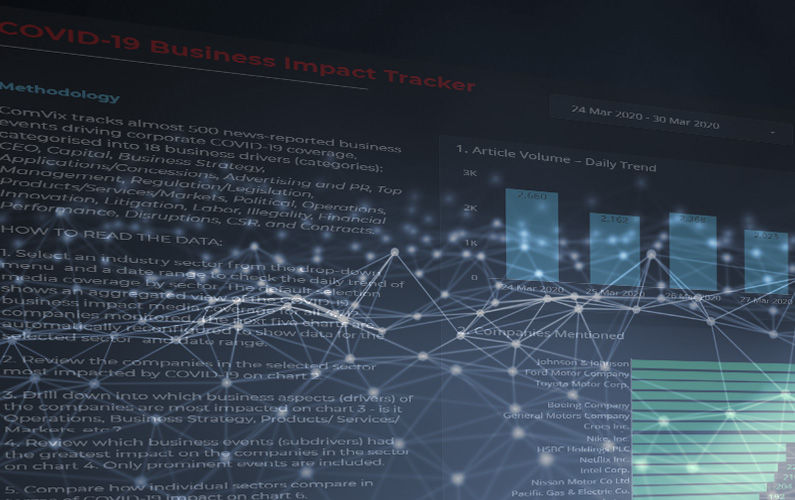With almost all its airline customers struggling to survive due to travel restrictions and a slump in demand, the aerospace industry has been one of the hardest hit by the coronavirus pandemic.
As global airline revenues are now forecast to drop by more than $314bn in 2020, aerospace companies are facing an unprecedented amount of cancelled contracts and production halts, leading analysts to believe that the sector is experiencing the worst crisis in its history.
We decided to use the Commetric COVID-19 Business Impact Tracker to analyse the effects of the COVID-19 crisis on the aerospace, defence and aircraft companies. Our free tool uses rule-based natural language processing (NLP) and machine learning to track more than 450 types of news-reported business events that affect companies and industries during the pandemic.
We analysed 112,643 articles from 7,224 online media outlets for the period 15 January – 30 April 2020, covering most publicly-traded companies in the US, and looked into the business drivers that gained the most traction in the media in the context of the COVID-19 pandemic.
We found that the most impactful business driver was financial performance, which featured articles primarily on financial forecasts and earnings announcements, with many companies reporting worse than expected results.
The most prominent company here was Boeing, the world’s largest commercial aircraft manufacturer, which reported a loss of $641 million for the first quarter of 2020.
The company’s financial troubles were complemented by the grounding of its best-selling 737 Max after two fatal crashes. But while the short-term cost of fixing the jet would probably be manageable for the aerospace giant, fixing the company’s image could take much more resources and time.
Financial performance was also the main driver around companies like Embraer and Textron, as well as Lockheed Martin, the Pentagon’s top weapons dealer, whose sales were hurt by delayed shipments of vital supplies.
Overall, commentators expected the US defence sector, which was deemed essential early on in the pandemic, to experience much less COVID-19 disruption because of its stable cash flows compared to industrial markets.
Nevertheless, the conversation around defence companies was also dominated by gloomy financial results. For example, defence contractor General Dynamics missed Wall Street estimates as travel restrictions delayed its deliveries.
Most of the newsflow within the operations driver also concerned Boeing: in April, the company reported that it will resume its commercial aeroplanes production in a phased approach at its Puget Sound-region facilities, after suspending operations last month.
In fact, Boeing was the most often mentioned company in the discussion around the coronavirus across all industries, as per our COVID-19 Business Impact Tracker. In the aerospace sector, it significantly outperformed rivals:
In addition to financial performance and operations, Boeing also gained media traction because of the labour driver, since it announced many job cuts, mainly in its commercial aeroplanes division.
The company also had the highest volume of news coverage within the board driver, as former United Nations ambassador Nikki Haley resigned from the Boeing executive board, arguing that she cannot support the direction the board is going towards.
The conversation around other companies was driven by their relationship to Boeing: for example, Spirit AeroSystems stopped production for the planemaker and furloughed workers supporting Boeing programs in Kansas and Oklahoma.
CEO was also a major driver, with Boeing’s CEO David Calhoun saying that it will take years for the aircraft-building business to return to its pre-pandemic levels.
The CEO driver was what gave Space Exploration Technologies (SpaceX) its media prominence: in a memo to SpaceX employees, Elon Musk said that they were far less likely to die from the pandemic than car crashes.
Musk’s attitude towards the virus also boosted coverage around Tesla, as its CEO famously tweeted that “the coronavirus panic is dumb” but then promised to donate hundreds of ventilators.
SpaceX was also one of the few aerospace companies gaining traction because of the CSR/governance driver: its workers were told to stop using Zoom for teleconferencing as the firm reportedly has concerns over the software’s safety.
It was also one of the few aerospace players which owed its prominence to the innovation driver, as it launched a batch of 60 Starlink satellites into orbit.
Meanwhile, the media discussion around Hexcel was shaped by the capital driver, as its planned US$6.4 billion all-stock merger with Woodward was abandoned because of the pandemic’s impact on the aerospace industry.
